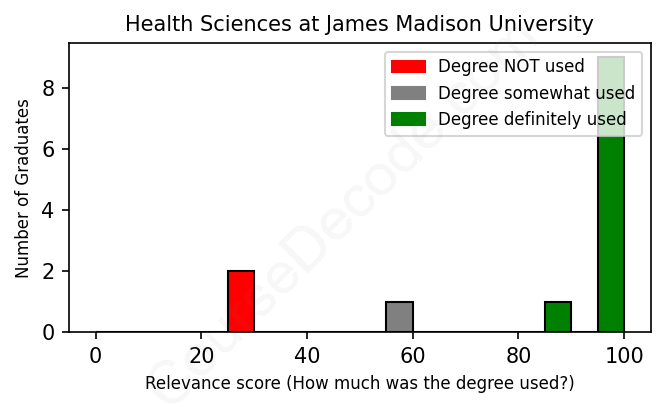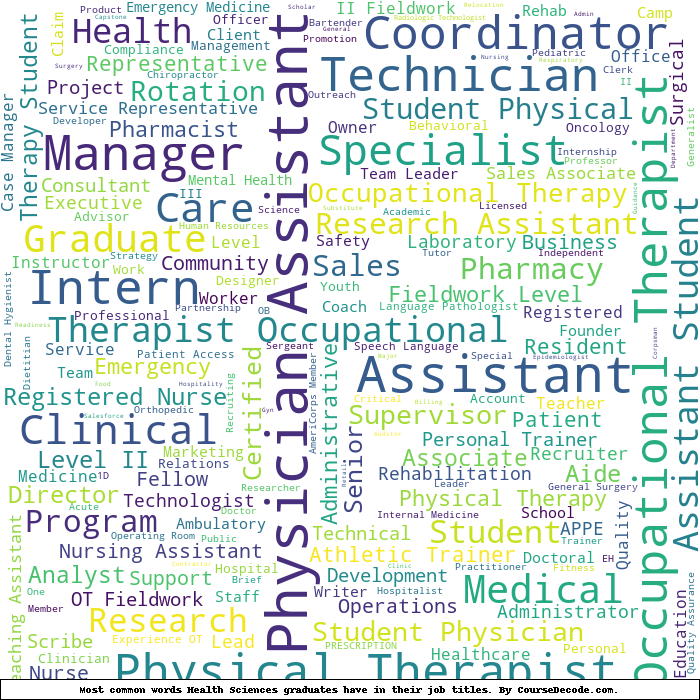
First, some facts. Of the Health Sciences graduates from James Madison University we've analyzed , here's how many have used (or NOT used) their degree in their career:

These are estimates based on AI analysis of 13 LinkedIn profiles (see below).
The verdict? Significantly above average. Overall, with an average relevance score of 83%, Health Sciences graduates from James Madison University have a much higher likelihood (+16%) of finding work in this field compared to the average graduate across all fields:
And for comparison, here's the chart for all profiles we've looked at across all degrees.
Also, after graduating, 76% of these graduates have pursued further education other than another Bachelor's degree (such as a Masters degree or other), compared to the average across all profiles of 35%. This suggests you may need more than just a Bachelors degree to be competitive as a Health Sciences graduate.
See the details:
|
Relevance score: 27% We think this person has NOT gone into a career related to their degree. We think this person has NOT gone into a career related to their degree.
DEGREE INFOGraduated in 2019 from James Madison University with a Bachelor of Science - BS in Health Sciences. Also pursued further education since (see below). JOB HISTORY SINCE GRADUATIONOffice Administrator PURCELLVILLE ORTHOPEDIC PHYSICAL THERAPY, LLC Aug 2020 - Oct 2022 Account Representative  Carahsoft Oct 2022 - Present FURTHER DEGREES DONE SINCE GRADUATINGUnknown degreeLiberty University 2021 - 2022 ABOUTNo information provided. |
The top 10 most common jobs done by the graduates we've analyzed (ranked most common to least) are:
When looking at the job paths of graduates from James Madison University's Health Sciences program, it’s clear that a significant number have gravitated towards roles in healthcare, particularly in clinical settings. Many of the alumni have found positions as chiropractors, physical therapists, and physician assistants, all of which heavily rely on the principles and knowledge obtained during their studies. Notably, these roles involve direct patient care and apply a range of health sciences competencies, making them very relevant and tied to their degrees. Participants in internships, like those in physical therapy and chiropractic care, also show a strong connection to the discipline, highlighting how hands-on experience solidifies the practical application of their education.
However, not all paths taken by graduates seem closely linked to health sciences. Some alumni ventured into areas like project coordination, administrative roles, or positions that focus more on leadership rather than healthcare. These jobs often don’t utilize specific knowledge from health sciences, which can make them appear less relevant overall. Still, it’s worth noting that even in those roles, skills learned in health sciences can provide a unique perspective or advantage, especially in sectors related to health policy or wellness programs. Overall, while many graduates have found jobs firmly rooted in health sciences, there's a noticeable portion who have diverged into fields that, albeit indirectly, may still benefit from their educational background.
Here is a visual representation of the most common words in job titles for Health Sciences graduates (this is across all Health Sciences graduates we've analyzed, not just those who went to James Madison University):

Looking at the career paths of graduates from the Health Sciences program at James Madison University, it seems that many of them have generally pursued careers closely related to their field of study. For instance, graduates often start off in hands-on roles such as physical therapy aides or chiropractic interns right after graduation. Those who went on to further their education often find themselves in positions like physical therapists or physician assistants not long after completing their advanced degrees, showing a clear trajectory in healthcare professions. Others have branched into administrative or managerial roles within the healthcare sector, which indicates a broader application of their health sciences background.
Fast forward five to ten years, many of these alumni have solidified their positions in the healthcare industry, taking on roles like directors or program managers that leverage both their health sciences education and their accumulated experience. While some may have ventured into more unconventional paths or temporary roles at the beginning, a majority have found long-term success within health-related fields, which gives a positive outlook on their career trajectories. Overall, graduates from this program seem to be doing well, often landing jobs that not only resonate with their education but also contribute to their professional growth over the years.
Honestly, a Bachelor’s degree in Health Sciences can be a bit of a mixed bag—it really depends on your strengths and interests. At James Madison University, you’ll likely find a solid balance of challenging coursework and engaging hands-on experiences, especially if you’re into the sciences. While some people find the classes like biology, chemistry, and anatomy to be tough, especially with all the detail you need to know, others thrive on that challenge because they're passionate about it. Overall, it's definitely not a walk in the park, but if you're motivated and willing to put in the effort, you can definitely handle it!
Most commonly, in the LinkedIn profiles we've looked at, it takes people 4 years to finish a Bachelor degree in Health Sciences.
So, looking at these graduates from James Madison University, it seems like there's a mix of job paths and earning potential. The folks who went into chiropractic and physical therapy fields likely have a decent income given the demand for those roles, especially after gaining some experience. The ones working in health program management or as consultants appear to be climbing the ladder to more prestigious positions, which often come with better pay. However, on the flip side, the CNA and veterinary tech roles might not pull in as much cash, especially starting out. Overall, while some are likely making pretty good money, there are definitely others who might be earning more modest salaries. It’s clear that choosing the right path in health sciences can significantly impact how much you make!
Here is a visual representation of the most common words seen in the "about" section of LinkedIn profiles who have a Bachelor degree in Health Sciences (this is across all Health Sciences graduates we've analyzed, not just those who went to James Madison University). This may or may not be useful:

Here are all colleges offering a Bachelor degree in Health Sciences (ordered by the average relevance score of their Health Sciences graduates, best to worst) where we have analyzed at least 10 of their graduates:
| College | Score | Count |
|---|---|---|
 James Madison University James Madison University
|
83 | 13 |
 University of South Florida University of South Florida
|
72 | 17 |
 University of Central Florida University of Central Florida
|
57 | 12 |